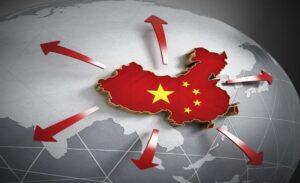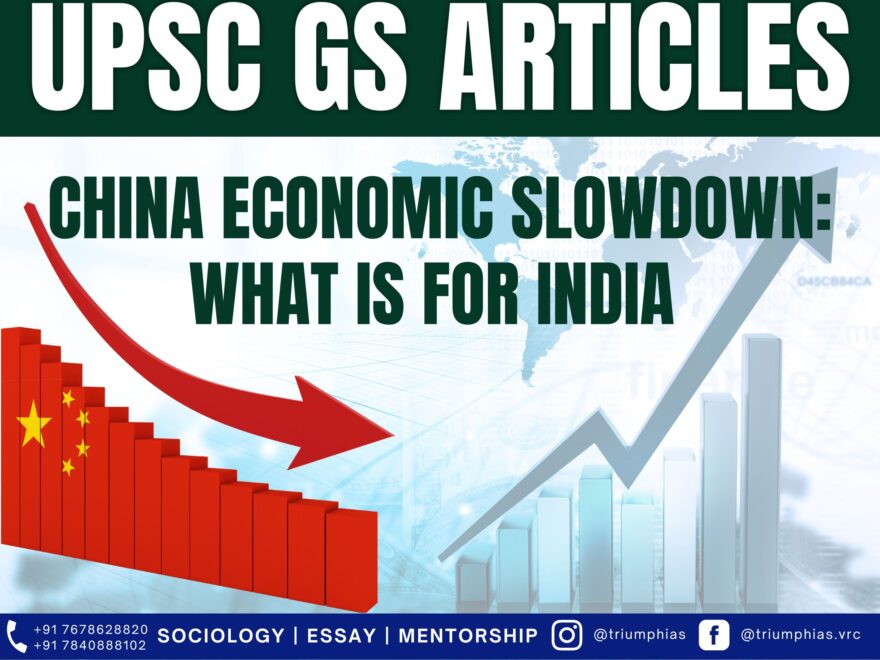China Economic Slowdown: What is for India?
(Relevant for General Studies Paper Prelims/Mains)

China Economic Slowdown: What is for India?
Anticipated to make a recovery this year following three years of a zero-Covid policy, the Chinese economy is facing an unexpected turn of events. Recent economic indicators reveal that the world’s second-largest economy has entered a state of deflation. Notably, both retail sales and industrial production have fallen short of the projected estimations. Of greater concern is the contraction in domestic demand. Apartment prices, along with a variety of goods and services, have experienced a decline, leading to a reduction in the Consumer Price Index-based inflation.
Causes behind this Slowdown
- China’s strategy of eradicating Covid-19 cases within its borders through repeated lockdowns, travel constraints, and widespread testing has not only led to significant disruptions in global supply chains but also triggered a series of manufacturing relocations. These factors, coupled with geopolitical tensions, have contributed to the weakening of both domestic growth and consumer spending.
- The current state of the Chinese economy is marked by a crisis of confidence, driven by a combination of factors. One pivotal issue is the near-collapse of the housing sector, which has been heavily reliant on debt for its sustained growth and constitutes approximately 30% of China’s GDP.
- China’s rapid economic expansion was fuelled partly by substantial borrowing, resulting in a substantial accumulation of debt in the economy. If not managed judiciously, this debt burden could potentially impede future growth.
- The Chinese government’s decision to impose stricter regulations on its dynamic tech sector, encompassing areas like video gaming, ed tech, and e-commerce, was prompted by concerns about the excessive size and influence of these tech giants. This crackdown has led to significant revenue losses and widespread job cuts, as numerous companies were compelled to downsize or cease operations.
- China has been endeavouring to shift its economic model away from overreliance on exports and investment toward a more balanced approach that prioritizes domestic consumption and innovation. However, this transition has proven challenging, resulting in lower growth rates, increased debt levels, and heightened financial risks.
- Trade tensions between China and the United States have escalated since 2018, leading to the imposition of tariffs, sanctions, and decoupling measures that have adversely impacted both economies. This trade dispute has resulted in a reduction of China’s exports, investment, and access to essential technologies and markets.
Global worries about this slowdown
- Earlier, the IMF had predicted that China would contribute to 35% of the worldwide economic growth for this year, but this projection seems increasingly unlikely.
- Recent data indicates that China might face challenges in attaining the growth objective of approximately 5% that was established for the current year.
Opportunities for India
- Numerous nations and corporations are exploring options beyond China for their supply of raw materials, intermediate goods, and final products, particularly in industries like electronics, pharmaceuticals, textiles, and automobiles. India holds the promise of becoming a favored choice for these sectors, thanks to its expansive domestic market, skilled labour pool, cost-effective workforce, and advancing infrastructure.
- China’s decelerating economy has diminished its appeal as a target for foreign investment. In this scenario, India can leverage this chance by presenting a steady and favourable business atmosphere. This can be achieved through the simplification of regulatory obstacles, granting tax benefits, and streamlining processes related to land acquisition and labour reforms.
- China’s economic deceleration has unveiled its weaknesses concerning innovation and research and development (R&D), notably in sectors like semiconductors, artificial intelligence, biotechnology, and aerospace. India can take advantage of this situation by boosting investments in its own innovation and R&D framework.
- This can be achieved by nurturing partnerships among academia, industry, and government and promoting a climate of entrepreneurship and willingness to take risks.
- The impact of China’s declining demand is strongly felt in commodity markets. If China decides to export essential metals and other commodities at lower rates due to reduced demand, it could potentially be advantageous for our domestic manufacturers.
Steps taken by India to leverage this opportunity
- Enhancing its exports to global markets, particularly in sectors where China’s competitive edge is diminishing. As a case in point, India’s exports of engineering goods, chemicals, pharmaceuticals, and textiles have shown substantial growth in recent months.
- Attracting additional Foreign Direct Investment (FDI) from companies seeking alternative investment destinations to China. India has streamlined its FDI regulations, offered attractive incentives, and elevated its ease of doing business ranking to entice a greater influx of investors.
- Strengthening its domestic manufacturing and consumption through diverse strategies and policies like the Production Linked Incentive (PLI) initiative, the Atma Nirbhar Bharat Abhiyan, and GST reforms.
- These measures are designed to enhance India’s self-sufficiency and ability to withstand external shocks. Fostering strategic and economic partnerships with other nations, especially in the Indo-Pacific region, as a counterbalance to China’s influence and assertiveness.
- India has engaged in various multilateral discussions and forums, including the Quad and BRICS, to foster regional collaboration and ensure stability.
India aims to establish itself as a significant contender in the worldwide supply chain and a prominent manufacturing center, directly challenging China’s position. Initiatives like the Production Linked Incentive (PLI) program have been introduced to bolster domestic manufacturing. India’s ‘China plus one’ approach to diversify its sources could gain traction in the event of a reduction in Chinese exports.
To master these intricacies and fare well in the Sociology Optional Syllabus, aspiring sociologists might benefit from guidance by the Best Sociology Optional Teacher and participation in the Best Sociology Optional Coaching. These avenues provide comprehensive assistance, ensuring a solid understanding of sociology’s diverse methodologies and techniques.
China Economic Slowdown, China’s Economic, Economic Slowdown, China, China’s Economic, Chinese economy, Economic, Atma Nirbhar Bharat Abhiyan, Quad and BRICS, Foreign Direct Investment Foreign Direct Investment regulation, Consumer Price Index, China’s exports, China’s GPT, GPT, Production Linked Incentive, China’s decelerating economy, Recent economic, Best Sociology Optional Coaching, Sociology Optional Syllabus.
Why Vikash Ranjan’s Classes for Sociology?
Proper guidance and assistance are required to learn the skill of interlinking current happenings with the conventional topics. VIKASH RANJAN SIR at TRIUMPH IAS guides students according to the Recent Trends of UPSC, making him the Best Sociology Teacher for Sociology Optional UPSC.
At Triumph IAS, the Best Sociology Optional Coaching platform, we not only provide the best study material and applied classes for Sociology for IAS but also conduct regular assignments and class tests to assess candidates’ writing skills and understanding of the subject.
Choose The Best Sociology Optional Teacher for IAS Preparation?
At the beginning of the journey for Civil Services Examination preparation, many students face a pivotal decision – selecting their optional subject. Questions such as “which optional subject is the best?” and “which optional subject is the most scoring?” frequently come to mind. Choosing the right optional subject, like choosing the best sociology optional teacher, is a subjective yet vital step that requires a thoughtful decision based on facts. A misstep in this crucial decision can indeed prove disastrous.
Ever since the exam pattern was revamped in 2013, the UPSC has eliminated the need for a second optional subject. Now, candidates have to choose only one optional subject for the UPSC Mains, which has two papers of 250 marks each. One of the compelling choices for many has been the sociology optional. However, it’s strongly advised to decide on your optional subject for mains well ahead of time to get sufficient time to complete the syllabus. After all, most students score similarly in General Studies Papers; it’s the score in the optional subject & essay that contributes significantly to the final selection.
“A sound strategy does not rely solely on the popular
Opinion of toppers or famous YouTubers cum teachers.”
It requires understanding one’s ability, interest, and the relevance of the subject, not just for the exam but also for life in general. Hence, when selecting the best sociology teacher, one must consider the usefulness of sociology optional coaching in General Studies, Essay, and Personality Test.
The choice of the optional subject should be based on objective criteria, such as the nature, scope, and size of the syllabus, uniformity and stability in the question pattern, relevance of the syllabic content in daily life in society, and the availability of study material and guidance. For example, choosing the best sociology optional coaching can ensure access to top-quality study materials and experienced teachers. Always remember, the approach of the UPSC optional subject differs from your academic studies of subjects. Therefore, before settling for sociology optional, you need to analyze the syllabus, previous years’ pattern, subject requirements (be it ideal, visionary, numerical, conceptual theoretical), and your comfort level with the subject.
This decision marks a critical point in your UPSC – CSE journey, potentially determining your success in a career in IAS/Civil Services. Therefore, it’s crucial to choose wisely, whether it’s the optional subject or the best sociology optional teacher. Always base your decision on accurate facts, and never let your emotional biases guide your choices. After all, the search for the best sociology optional coaching is about finding the perfect fit for your unique academic needs and aspirations.
To master these intricacies and fare well in the Sociology Optional Syllabus, aspiring sociologists might benefit from guidance by the Best Sociology Optional Teacher and participation in the Best Sociology Optional Coaching. These avenues provide comprehensive assistance, ensuring a solid understanding of sociology’s diverse methodologies and techniques. Sociology, Social theory, Best Sociology Optional Teacher, Best Sociology Optional Coaching, Sociology Optional Syllabus.
Best Sociology Optional Teacher, Sociology Syllabus, Sociology Optional, Sociology Optional Coaching, Best Sociology Optional Coaching, Best Sociology Teacher, Sociology Course, Sociology Teacher, Sociology Foundation, Sociology Foundation Course, Sociology Optional UPSC, Sociology for IAS,
Follow us :
🔎 https://www.instagram.com/triumphias
🔎https://www.youtube.com/c/TriumphIAS
https://t.me/VikashRanjanSociology
Find More Blogs
|
Scope of the subject and comparison with other social sciences |
|||
|
|
|
|
Modernity and social changes in Europe |

